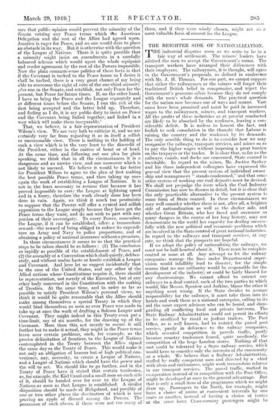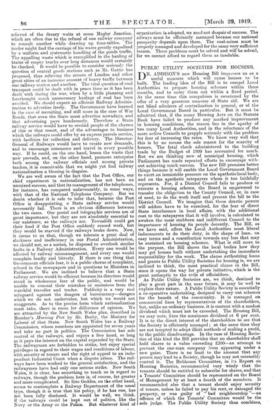THE BRIGHTER SIDE OF NATIONALIZATION.
THE industrial disputes seem as we write to be in a fair way of settlement. The miners' leaders have advised the men to accept the Government's terms. The transport workers have arranged their differences with their employers. The railwaymen, it is thought, will agree to the Government's proposals, as defined in conference with Mr. J. H. Thomas. For our part, we cannot suppose that either the railwaymen or the miners will forget their traditional British belief in compromise, and reject the Government's generous offers because they do not comply with the men's whole demands. The practical question for the nation now becomes one of wave and means. Vast sums have been promised and must 'he paid in increased wages to the railwaymen, miners, and transport workers. All the profits of these industries as at present conducted are likely to be absorbed by the workmen, leaving a con- siderable deficit. It is useless to lament the fact, and foolish to seek consolation in the thought that Labour is ruining the country and the workman by its demands. The only sensible thing to do is to consider how we may reorganize the railways, transport services, and 'nines so as to pay the higher wages without imposing a great burden on the taxpayer or the trader. It is clear that, so far as the railways, canals, and docks are concerned, State control is inevitable. In regard to the mines, Mr. Justice Sankey and his three independent colleagues have expressed the general view that the present system of individual owner ship and management " stands condemned," and that seine other system of working our coal deposits must be devised. We shall not prejudge the issue which the Coal Industry Commission has now to discuss in detail, but it is clear that the only practicable alternative to the present system is some form of State control. In these circumstances we may well consider whether there is not, after all, a brighter side of nationalization as well as the darker side, and whether Great Britain, who has faced and overcome so many dangers in the course of her long history, may not demonstrate to the world her capacity for dealing success- fully with the new political and economic problems which are involved in the State control of great national industries. In regard to the railways and transport services, at any rate, we think that the prospects are hopeful. If we adopt the policy of nationalizing the railways, we must not be half-hearted about it. There must be complete control or none at all. Any attempt to let the railway companies manage the lines under Departmental super- vision would infallibly lead to disaster, for the simple reason that no one authority would be responsible for the development of the industry,- or could be fairly blamed for any shortcomings. We cannot afford to entrust our railways to a dual control, each of the two parties to which would, like Messrs. Spenlow and Jerkins, blame the other if anything went wrong. If the State decides to assume responsibility for the railways, it must take them into its hands and work them as a national enterprise, calling to its aid the most expert advisers who can be found, and disre- garding all conflicting local and private interests. The State Railway Administration could not permit its efforts' to be sterilized by timid or jealous traders. The Post Office, as is well known, had to restrict the pared post service, partly in deference to the railway companies, which resented competition in parcels traffic, partly because country tradesmen feared, quite needlessly, the competition of the large London stores. Nothing of that sort could he tolerated by a State railway service, which would have to consider only the interests of the community as a whole. We believe that a Railway Administration, staffed by really competent men and directed by a chief with ideas and enthusiasm, might work tremendous reforms in our transport services. The parcel traffic, worked in co-operation instead of in competition with the Post Office, might be developed at once to the general advantage. But that is only a small item of the programme which we might draw up. Passengers to the North, for example, might have a choice of trains at convenient intervals by one route or another, instead of having a choice of routes at the same hour. Crass-country passengers might be relieved of the dreary waits at some Mugby Junction, which are often due to the refusal of one railway company to consult another while drawing up time-tables. The trader might find the carriage of his warm greatly expedited by a uniform and systematic handling of the goods traffic. The appalling waste which is exemplified in the hauling of trains of empty trucks over long distances would certainly be checked. It would be possible to consider seriously the question of central goods stations such as Mr. Gattie has proposed, thus relieving the streets of London and other great cities of an immense amount of heavy traffic between one railway station and another. The vital question of coal transport could be dealt with in peace time as it has been dealt with during the war, when by a little planning and forethought much unnecessary haulage of coal has been avoided. We should expect an efficient Railway Adminis- tration to advertise freely. The Government have learned in the case of recruiting, and still more in the case of War Bonds, that even the State must advertise nowadays, and that advertising pays handsomely. Therefore a State railway service would have to remind people of the charms of this or that resort, and of the advantages to business which the railways could offer by an express parcels service, with facilities for collection and delivery. The Director- General of Railways would have to create new demands, and to encourage commerce and travel in every possible way. If he could, on the one hand, lessen the waste that now prevails, and, on the other hand, promote enterprise both among the railway officials and among private traders, it is conceivable that we might yet find railway nationalization a blessing in disguise. We are well aware of the fact that the Post Office, our chief experiment in nationalization, has not been an unmixed success, and that its management of the telephones, for instance, has compared unfavourably, in some ways, with that of the National Telephone Company. But we doubt whether it is safe to infer that, because the Post Office is disappointing, a State railway service would necessarily fail. There is an obvious difference between the two cases. Our postal and telegraphic services are of great importance, but they are not absolutely essential to our existence, as the railways are. Townsfolk could get their food if the Post Office suddenly ceased work, but they would be starved if the railways broke down. Now, it seems to us that, though we tolerate a great deal of slackness and inefficiency in our Postal Administration, we should not, as a nation, be disposed to overlook similar faults in a Railway Administration. Every one would be affected by railway mismanagement, and every one would complain loudly and bitterly. If there is one thing that Government officials fear, it is a public chorus of complaint, echoed in the newspapers and in questions to Ministers in Parliament. We are inclined to believe that a State railway service would be efficient because its directors would stand in wholesome fear of the public, and would be unable to conceal their mistakes or omissions from the watchful traveller and trader. Publicity is a very real safeguard against the dangers of bureaucracy—dangers which we do not undervalue, but which we would not exaggerate. As to the precise form which nationalization must take, there is room for difference of opinion. We are attracted by the New South Wales plan, described in Monday's Morning Post by Mr. Beeby, the Minister for Labour of that State. New South Wales has a Railway Commission, whose members are appointed for seven years and take no part in politics. The Commission has sole control of the railways, and enjoys a free hand, so long as it pays the interest on the capital expended by the State. The railwaymen are forbidden to strike, but enjoy special privileges in regard to their wages and conditions of labour, with security of tenure and the right of appeal to an inde- pendent Industrial Court when a dispute arises. The rail- ways have been worked to the general satisfaction, and the railwaymen have had only one serious strike. New South Wales, it is clear, has something to teach us in regard to railways, though the problem here is, of course, far greater and more complicated. Sir Eric Geddes, on the other hand, seems to contemplate a Railway Department of the usual type, though it is true that his policy, if he has one, has not been fully disclosed. It would be well, we think, if the railways could be kept out of politics, like the Navy or the Army or the Police. But whatever kind of
organization is adopted, we need not despair of success. The ailways must be efficiently managed because our national prosperity depends upon them. The coal-mines must be properly managed and developed for the same very sufficient reason. These problems must be solved and will be solved, for we cannot afford to regard them as insoluble.



































 Previous page
Previous page